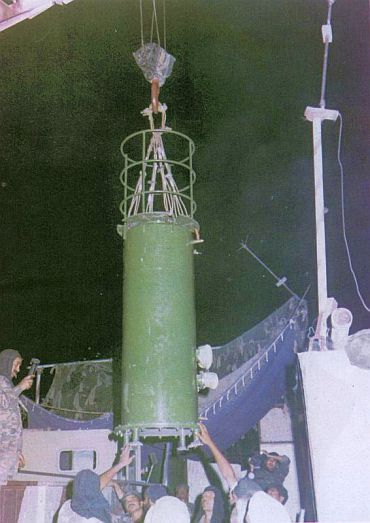
As always, Mr Subrahmanyam, who passed into the ages on February 2 this year, was at his magnificent, eloquent best.
Post 1998, how did the inclusion of India into the nuclear club take place? The French have claimed they were responsible for it.
Within two years even the Americans started being friendly to us. We realised the US was not hostile to us during the Kargil war, when Bill Clinton did not side with Pakistan, but sided with us.
Then in 2000, Clinton had a very popular visit to India. To that extent the relationship with the US started improving.
There was always a feeling among the major powers of the world, excepting China, that India was not an irresponsible power that it had already conducted a nuclear test in 1974 and had not rushed to build a nuclear arsenal.
The Russians, the French, even the Americans knew the China-Pakistan connection. How China had helped Pakistan develop nuclear weapons etc. The Indian compulsions were known.
Please click on NEXT to read further...
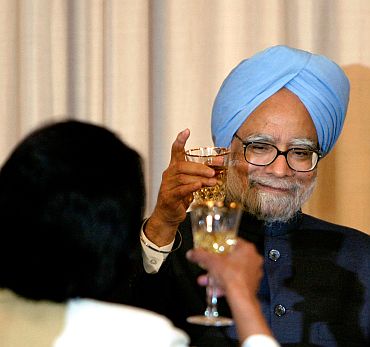
The French president's advisor did tell me that they took the initiative, but that was after George W Bush took office (as US president.
(Then French president) Jacques Chirac rang him up. The Russians have always been well disposed towards India.
I have a feeling that during the Bush-(Atal Bihari) Vajpayee interaction they had already started developing the Next Steps in Strategic Partnership. We were asking the Americans to show progress in three things: Nuclear, space and hi-tech. Those discussions were going on.
The American administration at that time, with Colin Powell as secretary of state, were not so favourably inclined to take such a major quantum jump. That came about in Bush's second term, when Condoleezza Rice became secretary of state.
They had in mind China's dominance in Asia and the need to have some balance in Asia. So when Manmohan Singh met George Bush in October 2004 during the UN general assembly, they had a discussion, but it is not quite clear whether Singh made any request regarding this or not.
But definitely by March 2005 when Rice came to India the Americans had made up their mind that they would help us in this respect. I would give a lot of credit for this to Bush and to a lesser extent to Rice. These two really brought this about.
Personally they were influenced by their idea of balance of power in Asia. They were not doing it because they liked us, but they were doing it for their own purposes. They could, of course, count on the help of France, Russia and Britain.
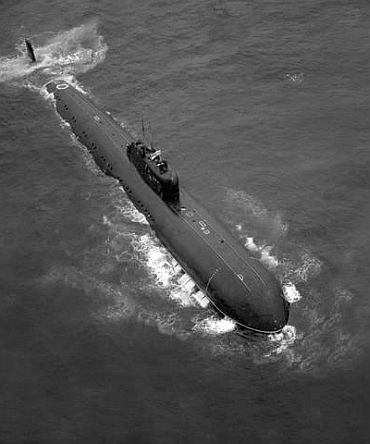
Yes, they helped us with the design of compact nuclear reactor that was necessary. They are also giving us a hunter-killer nuclear sub on lease. Earlier, they leased another one during Rajiv Gandhi's time. So there is no doubt there is Russian help. The PM has also publicly acknowledged it.
Our nuclear establishment is very small compared to other major powers. The Indian approach can be characterised as what we say in Tamil Nadu as that of a Tirupati barber.
When people take their children for tonsure at Tirupati, the barber clips a few locks of one child and goes to the next one because now he has 'booked' this child. Then he will take his own time to complete it. So whether we design aircraft at HAL or this (designing a nuclear submarine), it is the same.
The only people who are a little different are the space department. Everybody else says yes to everything when they have one design team.
Even the missile programme has not delivered what it promised.
Yes, in 1985, I asked (then head of India's missile programme A P J Abdul Kalam), 'With the number of people you have, will you be able to deliver this in this time frame?' He said 'Yes, yes we will.'
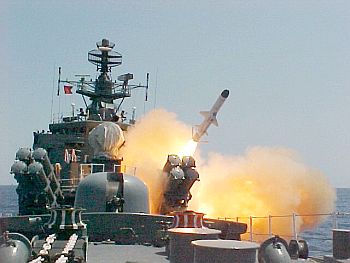
People have been mentioning it, but does India require an ICBM?
India needs a missile which reaches Beijing and Tianjin. That is about a 4,000 to 5,000 km missile.
If you start designing an ICBM beyond that range, you will make the Americans wary. Are we likely to go to war with the Americans?
Our people talk about our submarines going to the Pacific to target China. But there is no need for it. Your submarines can be in the Bay of Bengal and with a missile of 4,000 km to 5,000 km range you easily target Beijing and China.
After the Cold War, Russian weapon supplies have become uncertain. Then there is the objection to American end user arrangements etc. Should we focus on domestic defence production rather than imports?
People should be realistic. Even the Light Combat Aircraft has an American engine.
In short the answer is: In the world's arms market the demand is shrinking since the Cold War ended.
There is not going to be a war between the major powers of the world. There may be wars between say the US and Iraq or Afghanistan. Even they would be only for a short duration.
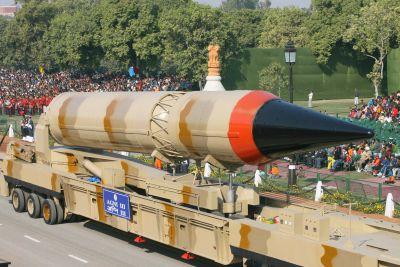

He had to as he was under pressure. I have a question. Under what circumstances would we need to resume the (nuclear) tests?
If there is such a grave deterioration in the international situation at some point in the future, then any way before you, others would have resumed testing.
Or if your weapons become obsolete...
There is not much chance of (nuclear) weapons becoming obsolete. The scenario of you alone being called upon to resume testing while the rest of the world does not is far-fetched. I cannot visualise it.
There is also computer simulation and sub-kilo ton tests to improve weapon design. Do we have the capacity for it?
If we do not have it, then we should develop it. You have to look at your manpower and how many weapons you need.
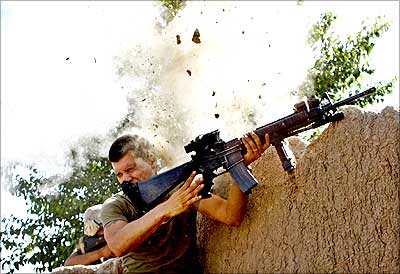
Yes we do. The Americans and Russians are planning to bring down theirs to 1,500. Then what do we need? So we have to have clear ideas on that.
What is your view of what is happening in Afghanistan and Pakistan?
There is no way the Americans can leave Afghanistan and Pakistan.
Don't you think the current Af-Pak policy is actually an exit policy?
Yes, but the main problem is they are trying to make the Pakistanis fight the war in their own country.
Some people say the US is outsourcing IT to India and war to Pakistan...
Yes, but the Pakistanis are also trying to play all sorts of smart games. In the process what is going to happen to Pakistan and US-Pakistan relations is very difficult to predict. When Hillary Clinton was here she made a statement, which was not picked up by the media.
She said the 9/11 plot was hatched in Pakistan. And the plotters are still there. All Obama has said is that we will go after them. The Pakistanis may think, like many others, that the Americans will tire and go away and then they can resume their games.
What they do not understand is if the Americans start tightening up saying if you fight there will be money and if you don't fight then there will be no money, then what will happen, we have to see.
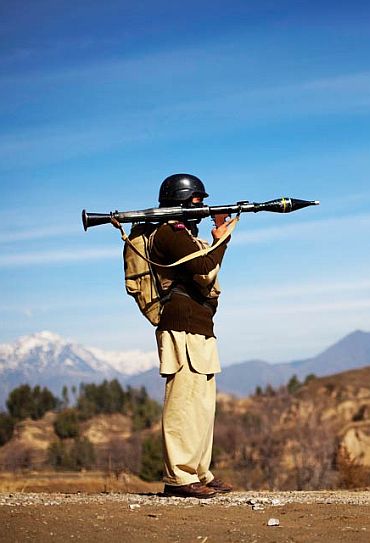
They will say that the Pakistani State is on the side of the Americans. So the Pakistanis will have to face that too. They cannot play a double game for too long.
You think they have made the choice?
They are trying not to make the choice. At present they have taken on the Pakistani Taliban and even in that there are serious questions regarding the seriousness of the fighting.
They go on saying 'We have killed so many' and still they have not got any leaders. They seem to have displaced a lot of civilians and how long can that continue?
They have been very short sighted. The Americans have already arranged an alternative supply line with the Russians and they are listening to the conversations of these people quietly, just as they did during 26/11. So they know what is going on.
The question is who is going to outsmart whom.
What do you think about what Prime Minister Manmohan Singh has started with Pakistan?
I have a feeling that you might have peace and stability with all other States: Bangladesh and the others, even with China, but I doubt very much you will be able to do that with Pakistan.
They are not a rational State. For them hatred of India is over-powering.
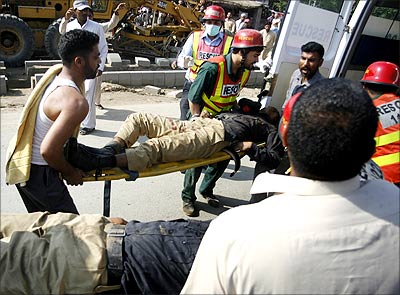
On the other hand we would say we will also have a say on your side and between the two systems let us see where Kashmiris on both sides would go.
But the main point is still even among the middle class (in Pakistan) the hatred of India is still very strong. So they are not ready to condemn the LeT (Lashkar-e-Tayiba). They have subliminal sympathy.
Is that because of Kashmir?
No that is not because of Kashmir. In fact, Kashmir is because of the two-nation theory, jihadi mentality etc. I have also interacted with Pakistanis. Javed Jabbar, who used to be a minister, was born in Madras (his father was police commissioner). He told me there will be no peace in South Asia till India breaks up into constituents.
First, they convinced themselves that Islam alone will unify and Hinduism cannot. Pakistan is a difficult and troubled State.
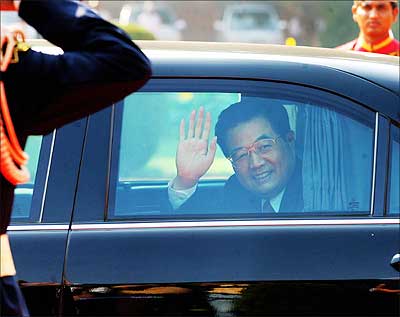
What is our problem with the neighbours? So long as our relations with China and the US were troubled, our neighbours took advantage of it.
If you improve relations with China and the US you will find that all your neighbours will adjust themselves.
But is that possible? The Chinese look at us as some sort of surrogates of the US.
It is possible. China is going to grow unless there are problems internally and the system changes. India will also grow. China will catch up with the US in overall GDP even though they may not have per capita income.
The Americans want to keep up their pre-eminence in terms of military, economic and technological power.
China is an aging country. The US and India are not yet aging, at least for another 30 years.
America can continue its pre-eminence only if it aligns strongly with India. Only then will it have access to man power, innovation, technology etc.
You are quite right. That is why the US needs India and India needs the US. What would be the Chinese reaction to this alliance?
China and the US are not going to fight with each other. It is a rivalry between the two for the top position in the world.
I have heard many people say, 'Why should we choose the Americans, why not the Chinese? After all, we have a 5,000-year-old relationship.'
So I tell them, 'Don't worry about yourself, but ask your son and grandson where they want to go to. China or the US? And you will have the answer!'
I would go a step further. Where would you be able to build a Balaji temple or a Meenakshi temple in China, which you can in the US?
Regarding China, it should be 'If you are not friendly to us, we will intensify our relationship with the US. We are prepared to balance our relationship with both of you. But if you are not going to be civil to us we will intensify our collaboration with them.'
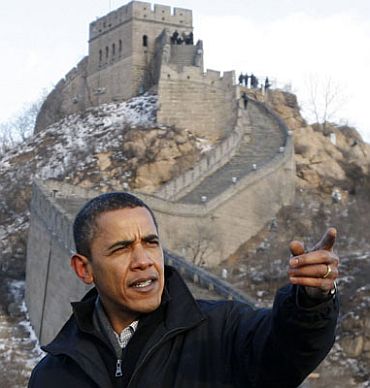
India does not have to worry about China's rise.
Whether it is Obama or George Bush, the US is not giving up its ambition to build up an unrivalled military force in the world, which no single power or a combination of powers can challenge. They will always have that goal.
Today 50 percent of the world's military expenditure is incurred by the US and more than 50 percent of R&D expenditure of the world. On that I don't think there will be any slack.
I think Obama feels that dealing with all these nations, engaging them, is a better strategy than confronting them. It is a sensible strategy. He is not doing it because the US is overstretched. After all, the reserve currency of the world is the dollar. The rouble was never the reserve currency of the world!
The Americans rightly claim that they are also a soft power.
Some say perhaps the only country that can rival the US in soft power in terms of culture, movies, religions etc is India.
In due course. You have the potential, that is the reason why the two countries getting together is an event that is long overdue and is taking place now.
It has nothing to do with Obama or anybody else, it is a natural process.
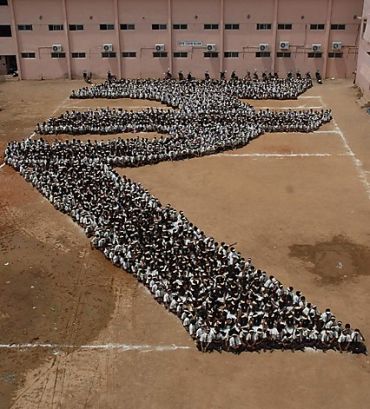
The Americans do not send their expeditionary force into all those countries where they own property or have business interests. They try to do it by influencing various groups in those countries.
Therefore, when we talk of our expansion etc we should also expand our ability to influence events in those countries.
We should be able to befriend various parties, groups and interests in most of those countries. In the future, force projection by way of going and occupying a country is going to be less and less.
You can defeat an army, but the real problem is how do you occupy a country. Iraq and Afghanistan have shown its futility. You could do it in the 18th and 19th centuries, you could do it up to Hitler, but not after that.
Therefore people who talk about force projection don't know what they are talking about. We are expanding our navy for the security of shipping lanes, maritime terrorism, piracy etc. It is not to threaten anybody.
But your economic power, your technological power, your commercial power -- those are things that make up real power.
When the depression happened and America collapsed, it did not matter to China or Japan. But today when American banks fail, the Chinese are seriously affected.
If the dollar goes down, the Chinese are worried. Not only that, even if somebody catches flu in the US, the world has to be put on alert! That was not the case before.
There is no doubt that the Americans are not only dominant, but they think they are a power that can dictate terms to the rest of the world and that is objectionable. Of course, that is not working.
Increasingly, countries are defying the Americans. We should not try to copy the 'ugly American'.
Already we have a reputation of doing that in our neighbourhood. That needs to be corrected. A day should come when Nepal. Bhutan, Bangladesh, Sri Lanka -- I am still leaving out Pakistan -- would be able to have a common market even something like the European Union.

That is right, but they were very nasty to us. Only now we have a new government. We should also not forget that basically it is still East Pakistan. It will take time.
Most importantly, India should look after her people, their food security, health and education. Then India will automatically become a major power.
Shivanand Kanavi, a physicist, author and journalist, is now Global Head, Marketing & Strategic Communication at CMC Limited.